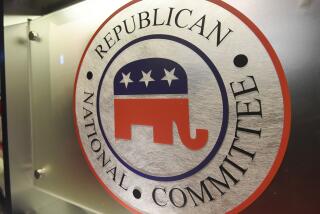Rivals lining up to run against Republican National Committee chief
Reporting from Washington — As the GOP focuses on unseating President Obama in 2012, Republican National Committee Chairman Michael Steele’s chances of keeping his job are slipping away, according to present and former party officials.
The chairman’s main task in the coming year is to provide a strong financial footing for the campaign. But Steele’s difficulties with raising and spending money are among the reasons some committee members want new leadership when his term expires next month.
“We’re a top-down party. We stick with the executive long after the ship has sunk, so I would never say that he can’t win,” said Norm Cummings, a former RNC chief of staff. “I would say it’s highly unlikely.”
Steele, the Republican Party’s first African American chief, was selected in the aftermath of President Obama’s election two years ago, when many in the GOP saw him as a charismatic counter to the first black president. Concerns that the anti-Steele campaign could be perceived as racially motivated could complicate efforts to replace him.
Party officials say the push for a new chairman is about Steele’s performance, not his race. They point to a falloff in giving from wealthy donors, staff turnover at party headquarters and Steele’s weakness for verbal gaffes.
Steele had appeared poised to hold onto his job after Republicans enjoyed one of their best midterm showings since President Franklin D. Roosevelt’s day.
But that has changed over the last month as an expanding field of rivals, including two former Steele allies, has taken aim at his record. Along with doubts about his viability, there are increasing questions about whether he will run at all.
The normally voluble Steele, a former lieutenant governor of Maryland, has been silent. Since a postelection conference call, he’s dropped from view.
His associates have gone from assuring reporters that he would run to claiming that they, too, are in the dark. Rumors have circulated of possible deals to ease him out into various private sector jobs.
Steele’s defenders, though acknowledging that the chairmanship is now wide open, point out that none of the challengers has gained traction.
The latest to enter is Wisconsin GOP Chairman Reince Priebus, who helped elect Steele and worked closely with him over the last two years. Priebus promised “a tighter ship,” “less drama” and “more hard work” at party headquarters.
Another prospect is Ann Wagner, a George W. Bush-era RNC co-chairwoman, who pledged to “restore the confidence of our donor base.” Former RNC political director Gentry Collins, a dark-horse contender, went almost overnight from defending the RNC’s performance under Steele to resigning as political director and assailing the committee’s lax fundraising.
Connecticut Republican Chairman Chris Healy blamed narrow GOP losses for governor in Oregon, Minnesota, Vermont and Connecticut on the RNC’s failure to provide more money for voter turnout.
“Clearly, the whole Steele administration has really been about promoting Mike Steele for whatever future role he was going to play in the American political debate and not really focused on what the core mission of the Republican Party is,” said Healy, who recently dropped plans to run for chairman himself.
The issue of race has worked to Steele’s advantage before. His main rival last time was a South Carolinian whose former membership in an all-white country club became an issue.
Privately, one party insider said, many members of the RNC “live in fear that Steele will go all the way through: show up at the election, run, lose and then give a big speech afterward” blaming his ouster on racial factors.
That may be one reason some Republicans are portraying the chairmanship election as anything but a referendum on Steele.
“This isn’t about firing somebody. This is about hiring somebody,” said Saul Anuzis, a committee member from Michigan, who was first to announce his candidacy.
Steele’s willingness to play the race card — he once said African Americans like himself and Obama are held to a higher standard — “really turned me off, and I know it turned off a lot of members, including his supporters,” Healy said.
As long as Obama remains in office, Republicans are unlikely to increase their support among blacks. But hints of intolerance or racial bias have the potential to complicate GOP efforts to attract moderate white swing voters, including suburban women and younger voters.
More to Read
Get the L.A. Times Politics newsletter
Deeply reported insights into legislation, politics and policy from Sacramento, Washington and beyond. In your inbox three times per week.
You may occasionally receive promotional content from the Los Angeles Times.










